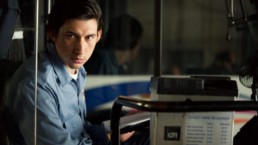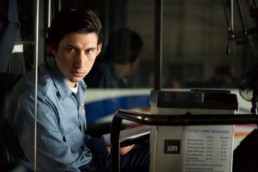In ‘Paterson’, Jarmusch Shows the Lyricism in Life Americana
In Paterson, writer/director Jim Jarmusch sprinkles in subtle surrealities that often go unnoticed into a week in the life of an observant bus driver.
The light-hearted surreality throughout the movie offers much to unpack, making Paterson more a poetically enrichening experience than a traditional film would offer.
The thing about daily life, since it’s typically lived in such a familiar, repetitive and track-like fashion, is that we often miss the subtle, magical coincidences that are going on around us all the time. In his latest movie, Paterson, writer and director Jim Jarmusch sprinkles in these subtle surrealities that often go unnoticed into a week in the life of a bus driver who quietly drives his routes and more quietly writes his original poetry, all while coincidence washes over him and his community, making a film that speaks to the beauty of everyday life and the role of an artist in it.
In this tone poem of a movie, which also plays more accessible than Jarmusch’s other films, Paterson is a film that operates more from the invisible structures of poetic stanzas than the freeform swirl that his last released film, the rock and roll-soaked vampire flick Only Lovers Left Alive, did. Like Lovers, which showed centuries-undead vampires suck up culture in arts music and history only to live alone in their same unfulfilled lives, there’s a similarity here that Jarmusch explores, following as equally an emotionless man who similarly takes in the pleasures of poetry without entertaining the thought of dreaming of publishing his own or even the very poetry in motion around him. It’s this failure to dream in which Jarmusch sets up his main character, Paterson (Adam Driver), the humble bus driver who coincidentally shares his name with the city where he drives his routes in Paterson, New Jersey, to show and study this noble pursuit of the artist: as one that is only valid when it’s realized rather than romanticized.
Following a day in the life from one Monday through the next in chapter-like fashion, Paterson is tuned to the rhythms of the day from sun-up to sun-down, waking up every day to face a wristwatch that reads around six-fifteen, hunching over a bowl of cereal at home, and scribbling some lines of poetry before setting off on his daily route, and before returning back home that he shares with girlfriend and bulldog who he walks to the local bar for a late-night nightcap – a process that more or less repeats daily. But it’s in the moments in between the mundane where Jarmusch hones in on, and where Paterson makes its message.
The rich tapestry of the city of Paterson hides its coincidences and meanings in plain sight – a young girl approaches Paterson with her original poetry about rain, a theme we see Paterson earlier write about in his poem about moving through trillions of molecule of water – showing the playful inter-connected themes that link the things between the days.
Although he’s a poet that scribbles things like how love is like his favorite matchbook brand, he doesn’t tie together the coincidence that his bohemian girlfriend Laura (Golshifteh Farahani) shares with him about her dream about twins, failing to see the many varied sets of twins that then populate throughout the rest of the film. The rich tapestry of the city of Paterson hides its coincidences and meanings in plain sight – a young girl approaches Paterson with her original poetry about rain, a theme we see Paterson earlier write about in his poem about moving through trillions of molecule of water – showing the playful inter-connected themes that link the things between the days. Instead, Paterson, the reluctant artist whose humility leads him to follow his same life’s track of driving the bus and writing his poems in his secret notebook, goes about his day meekly while larger life meanings play out around him.
Driver in the driver’s seat (pun intended) continues to shine in auteur-driven movies – of which this is the latest – delivering a finely controlled and nuanced performance. The quiet depth Driver brings forth in Paterson the man shows a man pondering the serious artistry of a mind stirring. It’s not that he’s not an insecure artist – he’s just an egoless one, more content living his hum-drum life than writing his poems for an audience of one then the restless activities of all those around him. His quiet but commanding performance anchors a film that is also as measured and patient, and within Jarmusch’s playfully dreamy movie, it’s not out of reason to think that Paterson himself is a physical embodiment, read tour guide or ghost of the blue-collar city.
The light-hearted surreality throughout the movie offers much to unpack, making “Paterson” more a poetically enrichening experience than a traditional film would offer. “Paterson” will be most loved by those willing to experience the movie much like they would a literary work, and actively working to unpack the movie for symbolism and themes like they would a poem itself. The role of the artist as poet is explored by Jarmusch, who in fact self-identifies as a poet over filmmaker, Jarmusch’s ode to the quiet American artist proves that there’s magic in the mundanities of real life, if only you choose to see it.
Ryan Rojas
Ryan is the editorial manager of Cinemacy, which he co-runs with his older sister, Morgan. Ryan is a member of the Hollywood Critics Association. Ryan's favorite films include 2001: A Space Odyssey, The Social Network, and The Master.


